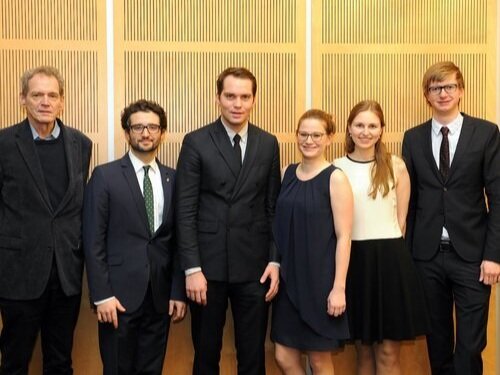Obermayer German Jewish History Award, Distinguished Service
Reinhard Führer
Berlin
As a child, Reinhard Führer endured regular taunts from his classmates because of his name. “They always said, ‘der Führer,’ (‘the Leader,’) referring to Hitler, so I knew what it felt like to be discriminated against because of a surname,” he recalls, “and I saw what the Jewish people must have suffered. I became engaged to do something so that nobody gets discriminated against.”
This motivation led Führer—who was born in Austria in 1945, raised near Stuttgart, and educated in Berlin—to embark on a path of lifelong public service, including 27 years as a Christian Democratic Union member of the Berlin House of Representatives, where he served as the body’s vice president for eight years and as its president from 1999 to 2001. During his time as president, Führer was instrumental in elevating the Obermayer German Jewish History Awards to national prominence. He invited Berlin’s Jewish community to move the ceremony from the Centrum Judaicum to the Berlin House of Representatives, starting in 2001, and he made a commitment on behalf of the city to continue honoring the award’s annual recipients.
Then, in what amounted to a second career, Führer became president of the Volksbund Deutsche Kriegsgräberfürsorg (War Graves Commission), a Kassel-based nonprofit organization dedicated to establishing and maintaining German war graves throughout the continent. During his 11 years directing the commission, Führer helped initiate the Riga Committee, a network of some 50 German member cities that built a memorial commemorating Jews who were sent from Germany to the ghetto in Riga, Latvia, where many perished during the Second World War. “Before, there was only the place, and they didn’t do anything with it or recognize it,” says Führer, “so we started [the memorial] and did this work.” Since 2002, under Führer’s leadership, the War Graves Commission has organized an annual international youth camp where young people from Germany, Latvia, Holland, Israel and elsewhere work together to maintain the cemetery.
Meanwhile, Führer has helped resuscitate the memory of the 12,000 German Jewish soldiers who fought in WWI for the German army. “I started a project to find documents and look at the names we had from WWI, and we found the names of about 1,900 Jewish people buried in our (war) cemeteries, mostly in France and Belgium,” says Führer, whose research helped Berlin’s Centrum Judaicum begin to research the families and grandchildren of those soldiers. “The German Jewish people went enthusiastically to war and risked their lives for Germany, and in the time of the Nazis they didn’t fear—they thought things would be okay [for them],” says Führer, but “these people were also deported and murdered by the Nazis and this, for me, is terrible. I cannot understand this, and I work so that they are not forgotten.”
Führer worked with the Centrum Judaicum and the Commission to produce an exhibition about the “Feldrabbiner,” or field rabbis who served the soldiers during WWI. In Berlin, Führer has also worked tirelessly to preserve the Jüdischer Friedhof Weißensee (Weissensee Jewish Cemetery), the largest Jewish cemetery in Europe, where he coordinates with the Commission, the German military and the Jewish community to honor Jewish soldiers each Remembrance Day in early November. In addition, Führer helps organize Berlin’s commemorations each year for Kristallnacht.
For his numerous political efforts, Führer has earned awards ranging from the Order of Merit 1st Class to the Käthe Kollwitz medal and the Golden Cross of Honor of the Bundeswehr. Explaining his lifelong dedication to Jewish remembrance, Führer says, “I cannot understand the work of the Nazis, of this terrible regime, and we do a little bit to heal the wounds.”
THIS WALL BRINGS PEOPLE TOGETHER
Students at this Berlin elementary school, built on the site of a synagogue, have been building a wall for the past two decades. It delivers a powerful message about community.
STUDENTS REACHING STUDENTS
When a handful of ninth graders from Berlin met Rolf Joseph in 2003, they were inspired by his harrowing tales of surviving the Holocaust. So inspired that they wrote a popular book about his life. Today the Joseph Group helps students educate each other on Jewish history.
“I SPEAK FOR THOSE WHO CANNOT SPEAK”
Margot Friedländer’s autobiography details her struggles as a Jew hiding in Berlin during World War II. Now 96, she speaks powerfully about the events that shaped her life and their relevance today.



